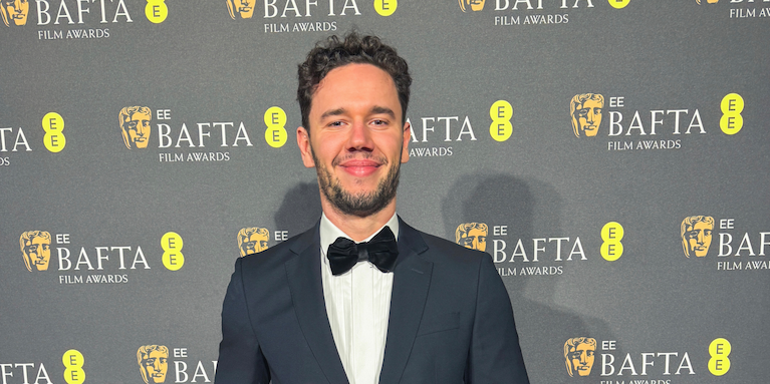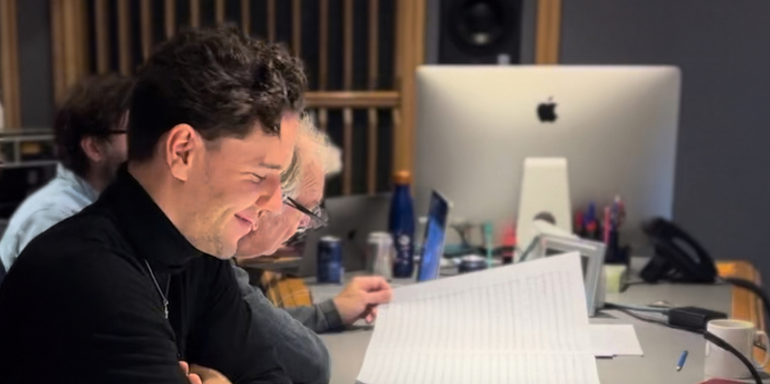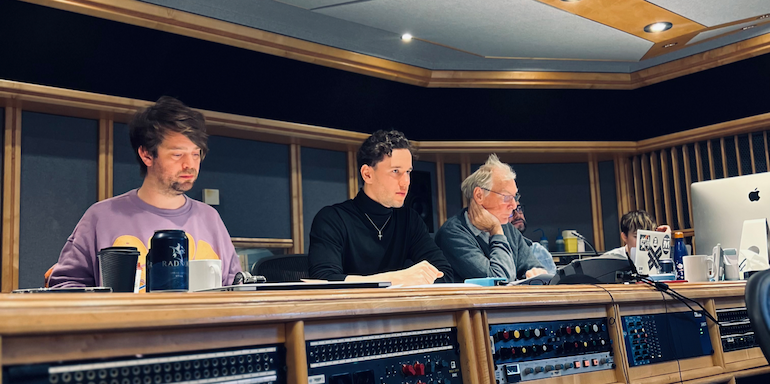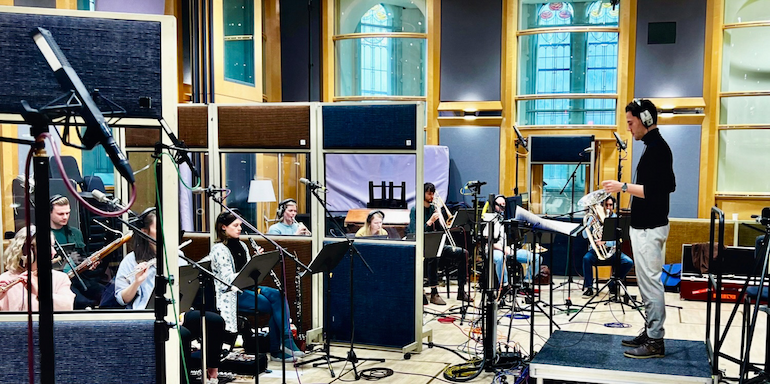
Course Studied: BA (Hons) Film Music
Year of graduation: 2021
Top Career Highlights:
- Winning a BAFTA with Rock, Paper, Scissors in the Best British Short Film category.
- 3rd prize (La Cinef) at Festival de Cannes with Bunnyhood
- Best Score nomination at the Hollywood Music in Media Awards for my score for Rock, Paper, Scissors
- Recording and conducting my compositions at AIR Studios in London, including guided improvisations for Knife’s Edge
- Graduating from the National Film and Television School’s Composing for Film & TV Master’s programme.

What inspired your musical beginnings?
I started learning piano when I was 3, and growing up, I was always surrounded by music. Over time, I lost interest in performing existing pieces and instead sought more freedom in writing my own compositions. Growing up in a small town near Kraków, I was fortunate to attend the Kraków Film Music Festival year after year from its early days, an experience that opened my eyes to the world of film scoring. It was a truly unique event for me, especially back in 2010, featuring incredible concerts and masterclasses with many of the world’s most acclaimed composers, so I made sure to take full advantage of those opportunities.
As for specific inspirations, I remember two works in particular that have resonated with me. In 2012, during the UEFA European Championship co-hosted by Poland and Ukraine, I first heard the amazing music of Two Steps From Hell as the players walked onto the pitch. Their music inspired me to explore composing for orchestra. Shortly after that, in 2014, I remember being deeply impressed and inspired by Alexandre Desplat’s score for The Grand Budapest Hotel, which blended folk elements with the orchestra in a beautiful and magical way.
How did studying Film Music prepare you for a career as a composer?
Studying Film Music definitely helped me gain a deeper understanding of all aspects of the craft. Each tutor had their own area of expertise within the film and music industries, and learning from their different perspectives was invaluable. Coming from a very classical music background, I feel I particularly benefitted from being encouraged to watch more films, especially catching up on the classics, which we would then analyse and discuss in class. The course also gave me the opportunity to connect with amazing coursemates, and discussing our work during film nights helped me refine my skills and gain a better understanding of how the audience may perceive my music. One of the highlights for me was taking the intercultural module led by Matt Anderson, which encouraged me to explore musical traditions from around the world. I was particularly drawn to Bulgarian folk rhythms like 7/8 and 11/8, which are a universe of their own, and I found that being familiar with them is surprisingly useful for film composers, especially when scoring action scenes or adjusting music precisely to picture. The Masterclasses on the course were also fantastic, particularly those with recent alumni, who offered a very realistic and unique perspective on life shortly after graduating.

What is the most important thing you learnt during your time at Leeds Conservatoire that has helped you progress in your career?
I think the most important thing I learned was good organisational skills across all aspects. From having backups of everything, using neatly organised templates, to showing up to after-school masterclasses and managing multiple projects simultaneously, good organisation has been invaluable. It has particularly helped me when scoring a few films at the same time or when, after thinking a project was finished, additional changes were required, which I found is surprisingly common.

What advice would you give to someone considering studying Film Music at Leeds Conservatoire?
You will get the most out of your experience if you are genuinely passionate about writing music for film and committed to pursuing this challenging career. Studying at Leeds Conservatoire will definitely help shape your style and provide a solid understanding of the basics needed to become a film composer, but to really make the most of it, you will need to push yourself and go the extra mile. Having very talented musicians studying around you is also a fantastic opportunity which I feel I did not take enough advantage of. Try recording live instruments as much as possible and learn from your peers. Besides, Leeds is a fantastic city to study in, offering a vibrant community of talented students and societies, while remaining compact and less overwhelming than London, which is great, especially if you are moving from a smaller town abroad.
If you could recommend one thing for a recent graduate to invest in to help further their career, what would it be?
It may sound obvious, but one thing I personally prioritised after graduating, and I think there is no excuse not to, is building a reasonable online presence. Start by creating your own website. It doesn’t have to be fancy, just something simple and functional is good. Showcase a few tracks, add a short bio, and direct people there whenever they want to hear your music. Next, make sure you’ve got at least one track on platforms like Spotify, Apple Music, or Amazon, and claim your profile by adding a bio and a professional picture. Add at least one film you’ve worked on to IMDb, even if it’s your first project and not your best yet. Or maybe you have a project that has been in a few festivals, but only the director and actors are credited. Claim your credit! Copy those projects to MUBI and TMDB, which will create your Letterboxd profile. Also, having an Instagram profile nowadays, I would say, is a must. It would be great if you kept updating those regularly, but for now, just create your profiles, copy the bio from your website, and add a nice, professional picture. I know so many talented composers and filmmakers without any online presence, and I feel it’s such a missed opportunity. Setting all of this up is free, aside from maybe the website, but there are cheap alternatives. It’s an easy way to establish your brand and make it easier for people to find and hire you.






